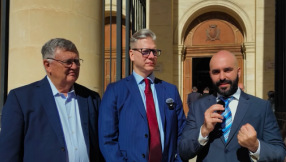Four Christians in Nepal, including one American woman, are being investigated by the authorities following allegations of proselytism.
The group were arrested on April 23 in Ghorahi, a city in Nepal's Dang Deukhuri District. In addition to the unnamed American woman, police detained Dilli Ram Paudel, the General Secretary of the Nepal Christian Society, Indian national Gaurav Sreevastab, and Kusang Tamang, from Nepal.
The unnamed American woman was released the following day, while the rest were held until April 29, Christian Solidarity Worldwide reports.
They were freed without bail by the Dang District Court, although the police investigation into the allegations has not been dropped.
There are restrictions on the practice of religion in Nepal. Under section 158 of its penal code, which came into force in August 2018, both proselytism and conversion are a criminal offence, carrying prison sentences of up to five years and a fine. Convicted foreigners face deportation within seven days of completing their prison sentence.
CSW said the Christians have been accused of distributing leaflets and undermining the majority Hindu religion. They are due to defend their claims in court, although no date has been set yet for the hearing.
Their lawyer, Govinda Bhandi Sharma, said the allegations were "baseless and biased".
"The four people in the current case were not involved in proselytism," he said.
"They had merely gathered in a church for a meeting with the Christian community. The law gives every Nepali the freedom to express their religion.
"The attitude of the Nepali authority has not changed even after the promulgation of the new constitution which makes Nepal a secular state with freedom of religion or belief. Article 26 of the Nepal Constitution allows that too.
"There has been a clear breach of fundamental rights here."
CSW's Chief Executive Mervyn Thomas welcomed the court's decision to free the Christians but said he was concerned about Section 158 of the penal code.
"We are pleased to hear the court's decision to release the Christians," he said.
"However, we are concerned for the Christian community in Nepal as Section 158 of the penal code has created an opportunity for discrimination, harassment and intimidation of religious minorities.
"We urge Nepal to repeal Section 158 of the Penal Code, which contradicts Nepal's constitutional guarantees on freedom of religion or belief and its commitment to uphold this right under international law."













